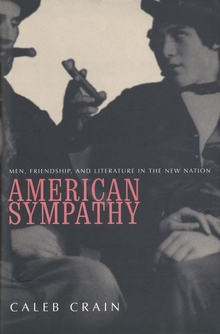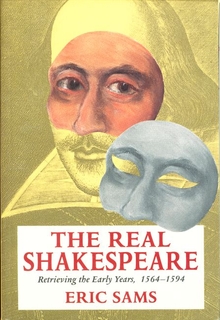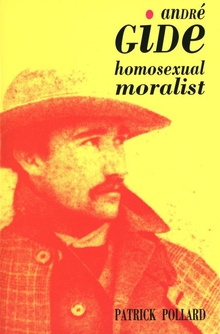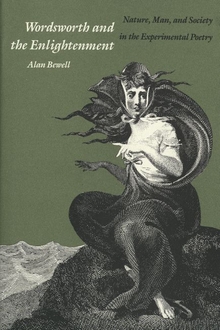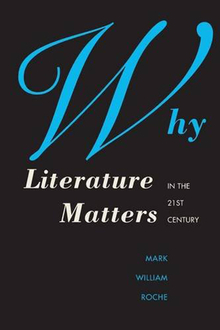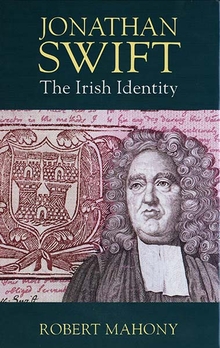American Sympathy
WARNING
You are viewing an older version of the Yalebooks website. Please visit out new website with more updated information and a better user experience: https://www.yalebooks.com
Men, Friendship, and Literature in the New Nation
Caleb Crain
“A friend in history,” Henry David Thoreau once wrote, “looks like some premature soul.” And in the history of friendship in early America, Caleb Crain sees the soul of the nation’s literature.
In a sensitive analysis that weaves together literary criticism and historical narrative, Crain describes the strong friendships between men that supported and inspired some of America’s greatest writing--the Gothic novels of Charles Brockden Brown, the essays of Ralph Waldo Emerson, and the novels of Herman Melville. He traces the genealogy of these friendships through a series of stories. A dapper English spy inspires a Quaker boy to run away from home. Three Philadelphia gentlemen conduct a romance through diaries and letters in the 1780s. Flighty teenager Charles Brockden Brown metamorphoses into a horror novelist by treating his friends as his literary guinea pigs. Emerson exchanges glances with a Harvard classmate but sacrifices his crush on the altar of literature--a decision Margaret Fuller invites him to reconsider two decades later. Throughout this engaging book, Crain demonstrates the many ways in which the struggle to commit feelings to paper informed the shape and texture of American literature.
In a sensitive analysis that weaves together literary criticism and historical narrative, Crain describes the strong friendships between men that supported and inspired some of America’s greatest writing--the Gothic novels of Charles Brockden Brown, the essays of Ralph Waldo Emerson, and the novels of Herman Melville. He traces the genealogy of these friendships through a series of stories. A dapper English spy inspires a Quaker boy to run away from home. Three Philadelphia gentlemen conduct a romance through diaries and letters in the 1780s. Flighty teenager Charles Brockden Brown metamorphoses into a horror novelist by treating his friends as his literary guinea pigs. Emerson exchanges glances with a Harvard classmate but sacrifices his crush on the altar of literature--a decision Margaret Fuller invites him to reconsider two decades later. Throughout this engaging book, Crain demonstrates the many ways in which the struggle to commit feelings to paper informed the shape and texture of American literature.
Caleb Crain is a contributing editor for Lingua Franca magazine and writes for The New Republic and The New York Times Book Review.
Crain presents a fascinating, if quirky, depiction of male friendship in early American thought. . .a valuable resource to. . .students.
An evocative study proposing that. . .male friendship and [its] outspoken language. . .are vital. . .to the development of early American literature.
"Remarkable and engagingly written, this book is a major contribution to the rethinking of the deeper origins of American prose style and substance."—Jay Fliegelman, Stanford University
“American Sympathy is a brilliant book about the essential issues and authors of early American literature, and it is written with a slyness and seductiveness worthy of those issues and authors. Indeed, it is one of those rare books that change with way we think about things that matter. Either as an indispensable text or as a cult classic, it will endure.”—Michael Zuckerman, Professor of History, University of Pennsylvania
“In his . . . evocative study, Crain . . . insists that the prominence of male friendship in early American literature is not a statistical fluke but a vital clue to its development. . . . Crain practices a kind of keyhole history in order to detect the nuances of language and behavior that escape a modern eye, but he also projects his discussion into a wider field.”—Graham Robb, New York Times Book Review
“Crain skillfully combines history, biography and literary criticism to interpret a variety of written effusions between men, ranging from diaries and letters to published works by Emerson, Melville and others.”—Clifford Chase, Newsday
“Caleb Crain’s American Sympathy: Men, Friendship, and Literature in the New Nation breaks through the he-man-writer’s wall to expose how literary friendships between men inspired their work.”—Elissa Schappell, Vanity Fair
“An evocative study proposing that the prominence of male friendship and the outspoken language employed to express it are vital clues to the development of early American literature.”—New York Times Book Review (Notable Nonfiction Books of 2001)
“Mixing historical research, biography, and literary criticism, Crain presents a fascinating, if quirky, depiction of male friendship in early American thought. . . . Will be a valuable resource to graduate students, historians, and researchers of early American thought.”—Choice
“Crain skillfully combines history, biography and literary criticism to interpret a variety of written effusions between men, ranging from diaries and letters to published works by Emerson, Melville and others.”—Clifford Chase, Newsday
“A thorough, well-written case study. . . . Its insights into the complexities of the school-choice process and the difficulties of true racial integration make its core chapters required reading for all sociologists interested in race, education, and inequality. . . . A first-rate book on the history, politics, and lived experience of a policy designed to erase the color line, one transfer student at a time.”—Meredith Phillips, American Journal of Sociology
“With wit and a pleasing style . . . Crain examines the deep, affectionate male friendships at the center of both the lives and the works of American authors Charles Brockden Brown, Ralph Waldo Emerson, and Herman Melville. . . . By closely examining not only the essays and novels of these authors but also their private correspondences and journals, Crain has written a unique study that is part biography, part literary criticism. . . . Crain’s close readings of both canonical novels and frequently ignored private writings are a substantial contribution to this area of scholarship.”—Virginia Quarterly Review
“Crain is most convincing in regard to Emerson; two painstakingly researched chapters on the man’s correspondence with his youthful followers will permanently alter our interpretation of the Sage of Concord. If Crain’s effort to push the canon of American literature into the queer-theory mold suffers from imperial overdrive, his close readings of the specific authors in question are first-rate.”—The Common Review (Best of Recent Books)
“[A] highly engaging book. . . . American Sympathy has much to offer students of the history of masculinity, affect, and literary production during the heyday of sentimentality and to those aware of the curious phenomenon of writing diaries for the loved one to peruse. . . . Would that A&E or the History Channel would bring material like this to our TV screens. . . . Individual chapters . . . are a collection of gems: valuable, beautifully written, and alert.”—Barbara Ryan, American Literature
Winner of the Melville Society’s Cohen Prize
Selected as a Notable Book of 2001 by the New York Times Book Review
ISBN: 9780300083323
Publication Date: May 11, 2001
Publication Date: May 11, 2001
320 pages, 6 1/8 x 9 1/4
11 b/w illus.
11 b/w illus.

